| Srl | Item |
| 1 |
ID:
191087
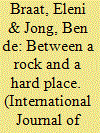

|
|
|
|
|
| Summary/Abstract |
While scholarly literature has paid attention to human intelligence professionalism from the perspective of the agent handler, we know relatively little about the precarious positions in which (double) agents often find themselves and what their ensuing needs from their handlers consist of. This article suggests that (double) agents desire a reciprocal, affect-based relationship with their handlers, involving trust and gratitude, more than just a negotiated relationship based on (financial) agreements. This article explains the importance of such a relationship. The main source of this research consists of original, in-depth oral history interviews with former double agent “M.” He operated from the 1960s through the 1990s for the Dutch Security Service and the Central Intelligence Agency against the East German Ministerium für Staatssicherheit. The article analyzes the varying degrees of appreciation that these services showed for his work, and it investigates their consequences on the psychological well-being of the double agent.
|
|
|
|
|
|
|
|
|
|
|
|
|
|
|
|
| 2 |
ID:
158767
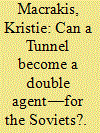

|
|
|
| 3 |
ID:
074143
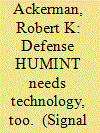

|
|
|
| 4 |
ID:
073463
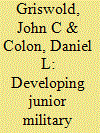

|
|
|
| 5 |
ID:
192258
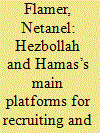

|
|
|
|
|
| Summary/Abstract |
Like any military power, violent non-state actors operate intelligence, including human intelligence (HUMINT), to suit their needs. The article aims to explore the primary methods used by Hezbollah and Hamas in recruiting and handling human sources since the mid-2000s, illustrating each method with several case studies. An examination of these methods may shed light on a significant aspect of the intelligence war waged by Hezbollah and Hamas against Israel. In addition, analysis of these organizations’ HUMINT activity demonstrates how violent non-state actors, which are inherently the weaker side in their asymmetric warfare against advanced state entities, can compensate for their disadvantages and conduct effective intelligence activity. The article reveals how the clever and creative use of HUMINT maximizes its benefits for violent non-state actors.
|
|
|
|
|
|
|
|
|
|
|
|
|
|
|
|
| 6 |
ID:
168284
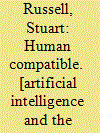

|
|
|
|
|
| Publication |
Great Britain, Allen Lane, 2019.
|
| Description |
x, 336p.hbk
|
| Standard Number |
9780241335208
|
|
|
|
|
|
|
|
|
|
|
|
Copies: C:1/I:0,R:0,Q:0
Circulation
| Accession# | Call# | Current Location | Status | Policy | Location |
| 059723 | 006.301/RUS 059723 | Main | On Shelf | General | |
|
|
|
|
| 7 |
ID:
166779
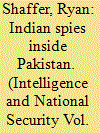

|
|
|
|
|
| Summary/Abstract |
This article examines India’s historical efforts to spy inside Pakistan from the mid-1960s to the early 1970s. It draws from memoirs of notable Indian spies who were jailed for espionage in Pakistan and spy ‘fiction’ written by former Indian intelligence and military officers who allege their writing is based on actual cases. The article highlights commonalities among Indian spies using the words of Indian officers to better understand human intelligence efforts inside Pakistan. It finds that Indian spies in these books have initially been Hindus or from multi-religious families, from the Indian-Pakistan border and have been poorly treated by the Indian government and its intelligence services.
|
|
|
|
|
|
|
|
|
|
|
|
|
|
|
|
| 8 |
ID:
109553
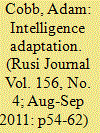

|
|
|
| 9 |
ID:
111612
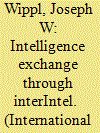

|
|
|
| 10 |
ID:
106853
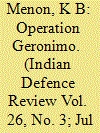

|
|
|
| 11 |
ID:
140497
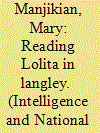

|
|
|
|
|
| Summary/Abstract |
Current methods of ascertaining the reliability of human intelligence focus predominantly on evaluating the reliability of sources. More leverage might be achieved through considering the reliability of narratives constructed or furnished by those sources. Lessons can be drawn from literary theory which examines the creation and reading of unreliable and untrustworthy narratives. A narrative can be unreliable and/or untrustworthy, even when the informant appears to be cooperating in furnishing information, due to his often unconscious biases or limitations in understanding or retelling the tale.
|
|
|
|
|
|
|
|
|
|
|
|
|
|
|
|
| 12 |
ID:
120430
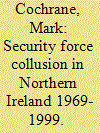

|
|
|
|
|
| Publication |
2013.
|
| Summary/Abstract |
In order to thwart and prevent terrorism the State is compelled to use all of the covert capabilities at its disposal in order to protect the society it serves. One of its most effective weapons is the use of human intelligence. Often acquired through secret relationships with terrorists or those with the ability to access preemptive intelligence. This important work is contentious for any democratic society as such practices and relationships, should they become known, inevitably beg the question-How far is it permissible for the State to go? A case study of State efforts to combat terrorism in Northern Ireland presents the moral, ethical, and legal dilemmas encountered and the propaganda opportunity such activity presents its detractors and critics. This article will identify key aspects related to the intelligence war and the development and creation of the concept of "collusion," a subjective issue, and one that has no legal definition.
|
|
|
|
|
|
|
|
|
|
|
|
|
|
|
|
| 13 |
ID:
116168
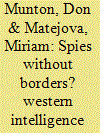

|
|
|
|
|
| Publication |
2012.
|
| Summary/Abstract |
Iran's Islamic Revolution and the takeover of the United States embassy in Tehran in November 1979 was America's and the West's first encounter with contemporary radical Islam. It prompted substantial intelligence cooperation amongst Western countries. Their liaison included not only the collection of human intelligence (Humint) but also an effort to protect six Americans who had escaped becoming hostages, and then a successful covert exfiltration operation to secure their escape from Iran. Canadian embassy staff, assisted by CIA experts, mounted this operation in late January 1980. We use the Iranian Revolution and occupation of the American embassy in Tehran both to flesh out the nature of contemporary Western Humint cooperation and to highlight the intelligence activities, including international intelligence liaison, of Western foreign ministries.
|
|
|
|
|
|
|
|
|
|
|
|
|
|
|
|
| 14 |
ID:
127455
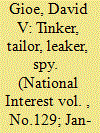

|
|
|
|
|
| Publication |
2014.
|
| Summary/Abstract |
BETWEEN THE TRIAL of Chelsea (formerly known as Bradley) Manning and the revelations of Edward Snowden, the debate regarding the leakers and their information has focused primarily on the balance between liberty and security, or between government transparency and secrecy. This is a necessary, even overdue, discussion. But it is also important to reflect upon the lasting damage these unauthorized disclosures will have on future U.S. intelligence collection.
|
|
|
|
|
|
|
|
|
|
|
|
|
|
|
|